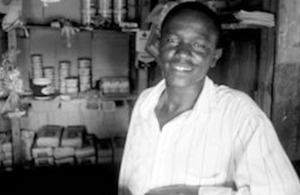DFID Research: Kenyan shopkeepers join fight against malaria
Retailers in Kenya have been trained in the identification and treatment of malaria

A Kenyan shopkeeper. Picture: IDRC
“Before I used to just sell drugs. These days I can tell when a person has a problem.”
This is the view of one Kenyan shopkeeper in the coastal Kilifi district of Kenya, an area where malaria is a common but also life threatening illness. He now knows how to spot the signs of malaria and advise on treatment thanks to the help of DFID-funded researchers.
Malaria particularly hits the young; it’s estimated that three quarters of a million young people die of malaria in Sub-Saharan Africa each year. Many die within 48 hours of becoming ill, so prompt treatment with the right drug at the correct dosage is vital. The World Health Organisation recommends that all childhood fevers in malarial areas should be assumed to be malaria and treated as such.
Researchers from the KEMRI-Wellcome Trust Research Programme and the Kenyan Ministry of Health developed a programme to see whether training retailers in the identification and treatment of malaria led to more effective treatment of disease. Community-based health workers trained and monitored shopkeepers under supervision of research staff and a district health management team. Workshops for drug retailers included training in identifying the causes and signs of malaria, the types of drugs and dosages for different age groups, and indicators for when shopkeepers should refer customers to health agencies. Refresher training activities were held each year, and shops were visited 3 times a year to monitor progress and provide ongoing support. At the same time a public information programme raised awareness in local people - telling them that retailers had received training, and giving information on the importance of early, effective treatment of malaria in children.
Surveys in households chosen randomly across the project area over a 4-year study period showed major improvements in the use of over-the-counter antimalarial drugs. Real improvements were seen only one year into the study, and by the fourth year, the proportion of shop-treated childhood fevers receiving the correct dose of a recommended anti-malarial drug within 24 hours of the start of a fever rose from 1% to 28%.
Early treatment of fevers using over the counter medicines also saved people money - malaria is both a disease of poverty and a cause of poverty. As one community member commented: “I used to use a lot of money… to treat fever. When you go to the private clinics you pay a lot of money and sometimes you do not get well. Now, with only 15 Kenyan Shilling you can get medicine for your child and the child will get well.”
More information
See DFID project record for Assessment of Shopkeeper Training Programme on Drugs for Fever